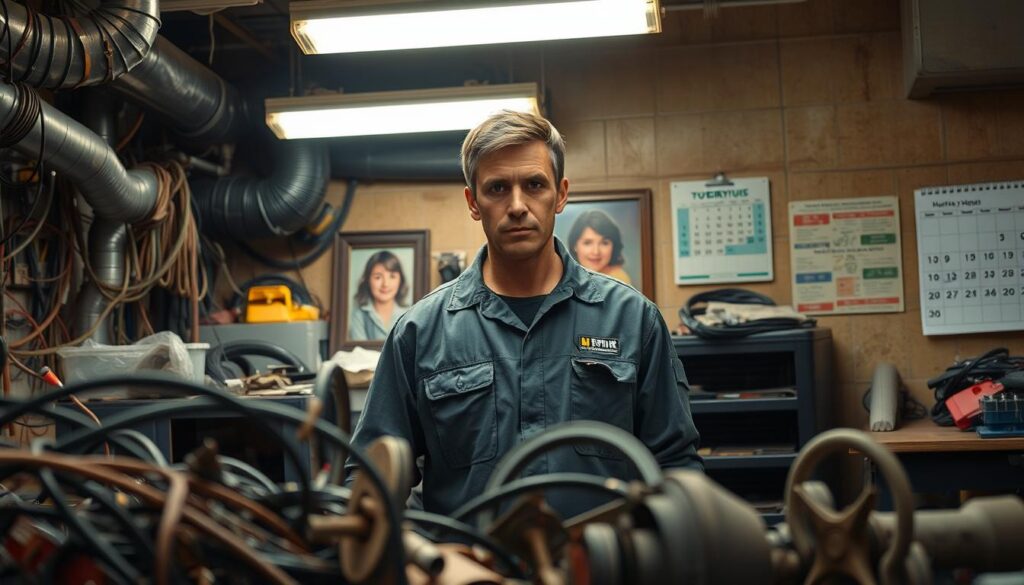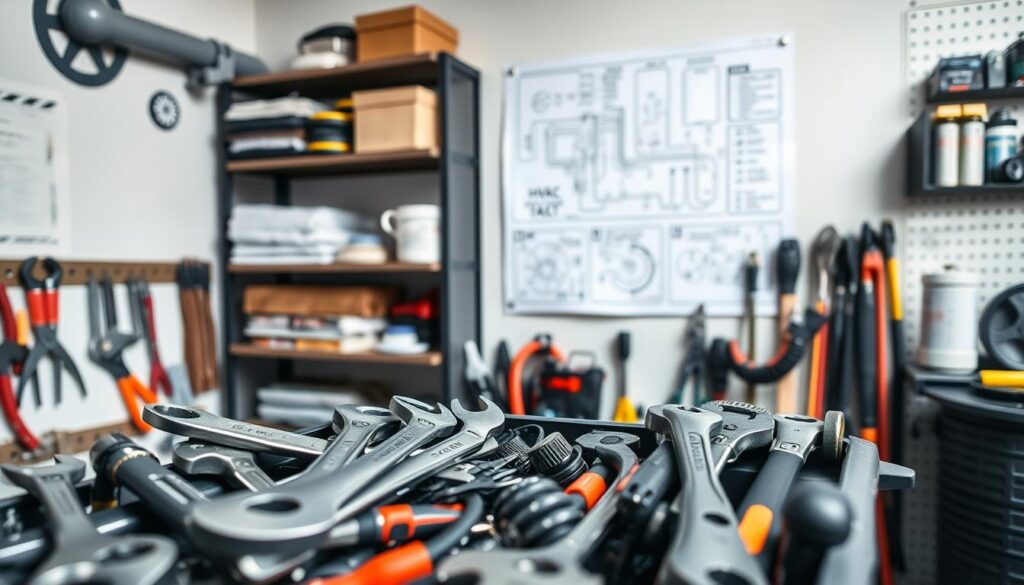Affiliate Disclosure
HVAC Guide Guys is a participant in the Amazon Services LLC Associates Program, an affiliate advertising program designed to provide a means for sites to earn advertising fees by advertising and linking to Amazon.
How Hard is HVAC Work? Ever wondered what it takes to be an HVAC pro? Is it as tough as people say, or just a myth? HVAC work is more than just controlling temperatures. It’s a mix of technical know-how, physical stamina, and solving problems.

HVAC work is tough. The U.S. Bureau of Labor Statistics says HVAC tech jobs will grow 9% from 2023 to 2033. This means big chances for those up for the challenge. The job needs experts who can handle complex systems and work in different, sometimes unpredictable places.
So, how hard is HVAC work? It’s a job that needs you to keep learning, be physically strong, and have technical skills. Technicians must keep up with new tech, tackle tough installations, and find solutions to keep places comfy.
Key Takeaways
- HVAC work requires a unique combination of technical and physical skills
- Continuous learning is essential in this rapidly evolving industry
- Career opportunities are expanding with technological advancements
- Physical demands are significant and require good health and fitness
- Problem-solving and customer service skills are critical for success
Table of Contents
Understanding the HVAC Industry Landscape
The HVAC industry is growing fast and full of opportunities. It reached nearly USD 159 billion in 2022. It’s expected to grow to $227 billion by 2028.
Current Market Demands and Growth
Working in HVAC offers exciting chances. The U.S. HVAC sector makes $150 billion a year. It also employs over 1.5 million people.
Key growth points include:
- Expected industry growth at 6.1% CAGR from 2021 to 2026
- Over 3 million heating and air conditioning systems replaced annually
- $14 billion spent on HVAC services and repairs each year
Commercial vs Residential HVAC Work
HVAC work is different in commercial and residential areas. There are many opportunities in each area:
| Sector | Market Share | Key Characteristics |
|---|---|---|
| Residential HVAC | 50.2% | Smaller systems, more frequent service calls |
| Commercial HVAC | 32.5% | Complex systems, longer installation times |
| Industrial HVAC | 17.3% | Specialized equipment, high-precision requirements |
Industry Evolution and Technology Changes
Technological changes are shaping HVAC careers. Smart technologies are changing the industry. The smart thermostat market is growing fast.
Energy efficiency and the environment are also big factors. They’re leading to new system designs and better performance.
The future of HVAC is smart, efficient, and environmentally conscious.
Staying up-to-date with new technologies is key. Improved SEER ratings show the industry’s focus on energy efficiency and sustainability.
Physical Demands of HVAC Work
HVAC work is one of the toughest jobs in construction and maintenance. Technicians need great strength, endurance, and agility. They do complex tasks in tough environments.
- Lifting heavy equipment up to 50 pounds often
- Working in tight, uncomfortable spaces needing constant bending and crawling
- Climbing ladders and navigating rooftops in different weather
- Maintaining precise hand-eye coordination for delicate equipment connections
“HVAC technicians must be as comfortable with physical labor as they are with technical skills,” says veteran technician Michael Rodriguez.
Being physically fit is more than just strength. Technicians spend a lot of time standing, walking, and doing detailed diagnostic tasks. Good physical fitness is key to staying safe and doing well on the job.
Training lasts from 6 months to 2 years. It prepares technicians for the tough physical challenges they’ll face. The job requires not just muscle, but also mental toughness and flexibility.
- Balance and coordination are critical skills
- Working in non-conditioned spaces like attics and rooftops
- Responding to service needs during peak summer and winter months
While there are no strict physical fitness requirements, being in shape helps a lot. It improves job performance and lowers injury risks in this demanding field.
Explore Our HVAC Shop
Looking for top-rated HVAC tools, parts, and accessories? Visit our shop and find the perfect solution for your needs.
Visit the ShopDaily Responsibilities and Workplace Challenges
HVAC technicians face a complex world of daily tasks. These tasks test their skills, adaptability, and resilience. It’s key to grasp the challenges of the HVAC workplace.
Common Tasks and Duties
Your day as an HVAC tech is filled with various important tasks:
- Troubleshooting system components
- Installing and removing equipment
- Conducting system diagnostics
- Advising customers on maintenance
- Selling service contracts
Time Management Requirements
Good time management is vital for HVAC technicians. They must juggle service calls, urgent repairs, and keep detailed records of their work.
| Skill | Importance Level |
|---|---|
| Critical Thinking | High |
| Communication | Critical |
| Technical Troubleshooting | Essential |
Weather and Environmental Factors
HVAC techs deal with unique challenges due to the environment. Extreme temperatures, unpredictable weather, and varied job sites demand great adaptability and physical stamina.
“In HVAC, every day is different. You must be prepared for anything.” – Professional HVAC Technician
With 7,900 reported injuries in 2020, it’s critical to understand and reduce risks. This is essential for success in this ever-changing field.
Explore Our HVAC Shop
Looking for top-rated HVAC tools, parts, and accessories? Visit our shop and find the perfect solution for your needs.
Visit the ShopHow Hard is HVAC Work: Reality Check
Understanding HVAC work’s true difficulty needs a detailed look. It’s not just about technical skills. It also involves mental, physical, and emotional challenges that make this job exciting.
HVAC technicians face tough workplace demands. They must handle complex systems, meet customer needs, and work in changing environments. This makes their job very diverse.
“HVAC work isn’t just about fixing machines—it’s about solving complex problems under pressure.” – Professional HVAC Technician
Key Challenges in HVAC Work
- Physically demanding tasks requiring strength and endurance
- Complex problem-solving in diverse environments
- Continuous learning of emerging technologies
- Customer service and communication skills
Looking at HVAC work’s difficulty, statistics are telling. The Bureau of Labor Statistics says the industry will grow 5% by 2031. This means there will always be a need for skilled workers.
| HVAC Work Aspect | Difficulty Level | Skill Requirements |
|---|---|---|
| Physical Demands | High | Strength, Stamina |
| Technical Knowledge | Moderate to High | Continuous Learning |
| Customer Interaction | Moderate | Communication Skills |
Despite its challenges, HVAC work is very rewarding. Skilled technicians turn complex problems into beautiful solutions. This makes every day a new adventure.
Career Path and Professional Development
Starting a successful HVAC career needs careful planning and ongoing learning. The HVAC field is full of exciting career paths and growth chances. It’s perfect for those who love technical and hands-on work.
Education and Training Requirements
Your HVAC career starts with education. Most people begin with:
- Vocational school programs
- Community college technical degrees
- Apprenticeship programs
- Trade school certifications
To get into HVAC, you usually need a high school diploma or similar. Many employers look for candidates with specialized training.
Certification and Licensing
Understanding certifications is key in HVAC. Important ones include:
- EPA Section 608 Certification
- NATE (North American Technician Excellence) Certification
- State-specific HVAC licensing
“Certifications are not just credentials, they’re your passport to professional credibility.” – HVAC Industry Expert
Advancement Opportunities
The HVAC field has great career growth. With time, you can move up to:
- Senior Technician
- HVAC Project Manager
- Business Owner
- Technical Instructor
With a 13% employment growth from 2018 to 2028, there’s a lot of room for growth. It’s for those ready to keep learning and growing.
Explore Our HVAC Shop
Looking for top-rated HVAC tools, parts, and accessories? Visit our shop and find the perfect solution for your needs.
Visit the ShopWork-Life Balance in HVAC

Working in HVAC can be tough on your personal life. Technicians often work up to 60 hours a week in busy seasons. This heavy workload can really stress them out.
“Balancing work commitments with family time is our biggest challenge,” says veteran HVAC technician Robert Martinez.
Some big hurdles in finding a good work-life balance include:
- Extreme weather-related emergency calls
- Unpredictable work schedules
- On-call responsibilities
- Seasonal fluctuations in workload
HVAC workers face unique stressors that can lead to burnout. The industry demands flexibility and resilience. Many have to choose between work and family, making it hard to find a balance.
Different areas in HVAC offer different work-life balance experiences. Commercial HVAC jobs usually have more regular hours than residential ones. Technicians need to manage their time well and set personal boundaries.
Ways to keep a balance include:
- Establishing clear communication with employers
- Utilizing time management techniques
- Prioritizing self-care and mental health
- Seeking supportive work environments
Despite the challenges, many HVAC workers find their jobs rewarding. They enjoy solving problems, staying active, and helping others. This sense of purpose can make up for the job’s demands.
Financial Aspects and Job Security
Looking into HVAC careers shows promising money-making chances. The HVAC field offers good job security and pay, making it a great choice for skilled workers.
Salary Expectations
Your earnings in HVAC depend on a few important things. Technicians can get good pay based on their skills and area of focus. The job requirements usually match the pay:
- Starting jobs have good base pay
- More experienced techs make more money
- Certifications can increase your earnings
Benefits and Compensation
HVAC careers come with great pay packages. Many jobs offer more than just a salary:
- Health insurance
- Retirement plans (401k)
- Chance for overtime
- Training and growth opportunities
*”The HVAC industry provides stable income with room for growth and specialization.”*
Market Stability
The HVAC sector is very stable. It always needs people to work on heating, cooling, and ventilation. California ranks as the #2 employer for HVAC technicians, showing strong job chances.
New tech and energy-saving trends keep the industry growing. Your skills will always be needed as buildings get more complex.
Explore Our HVAC Shop
Looking for top-rated HVAC tools, parts, and accessories? Visit our shop and find the perfect solution for your needs.
Visit the ShopEssential Skills for Success

To succeed in HVAC, you need technical skills and the ability to work well with people. It’s not just about knowing how systems work. You also need to be good at solving problems and communicating.
The job is tough and requires quick thinking and problem-solving. Employers want technicians who can handle complex tasks. They look for those who are skilled in both technical areas and soft skills like communication.
Critical Technical Skills
- Electrical system understanding
- Mechanical system diagnostics
- Blueprint reading
- Tool proficiency
- Safety protocol knowledge
Essential Soft Skills
- Customer communication
- Time management
- Adaptability
- Problem-solving
- Continuous learning
| Skill Category | Impact Percentage |
|---|---|
| Technical Proficiency | 35% |
| Customer Service | 30% |
| Problem-Solving | 25% |
| Adaptability | 10% |
“Success in HVAC is not just about knowing machines, but understanding people and their needs.” – HVAC Industry Expert
Building a strong skill set is key to success in HVAC. Keep learning and growing to stay ahead. This will help you move up in your career.
Health and Safety Considerations
Working as an HVAC technician comes with big physical risks and challenges. Technicians must always be careful and follow safety rules. They need to be ready for dangers in their work every day.
HVAC workers face many challenges that can harm their health and safety. It’s important to know these risks to stay safe and do well on the job.
Common Workplace Hazards
- Electrical risks with serious injury possible
- Chemical exposure from refrigerants and cleaners
- Working at heights with fall dangers
- Respiratory hazards from dirty air filters
Many HVAC technicians face big safety risks. Over 500,000 people are treated for ladder-related injuries every year in the HVAC field. This shows how important it is to stay safe.
Safety Protocols and Equipment
| Safety Requirement | Key Protective Measures |
|---|---|
| Personal Protective Equipment | Hard hats, safety glasses, electrical-resistant gloves |
| Electrical Safety | Voltage testers, insulated tools, proper grounding techniques |
| Chemical Handling | Respirators, chemical-resistant clothing, proper storage containers |
Long-term Health Impact
HVAC challenges go beyond immediate dangers. Technicians need to think about long-term health effects, such as:
- Musculoskeletal injuries from repetitive actions
- Respiratory problems from chemicals and dust
- Potential hearing damage from loud tools
- Risk of heat stress during outdoor work
The Bureau of Labor Statistics reports that HVAC technicians have one of the highest injury rates across all professions.
Your safety depends on ongoing training, using the right equipment, and knowing about workplace dangers. Good safety plans can greatly lower the chance of injuries in HVAC work.
Conclusion
Understanding how hard HVAC work can be is key for those thinking about this career. The HVAC industry is full of chances for skilled people who are up for the challenge. With a 15 percent job growth expected by 2026, your career could really take off.
Working in HVAC requires physical strength, technical know-how, and being able to adapt. Despite the hard work, many find joy in fixing complex problems and keeping people comfortable. The average salary is $45,910, and you could earn up to $73,000, making it a good choice financially.
Your success in HVAC depends on always learning, getting specialized training, and getting industry certifications. Schools like IntelliTec College offer great programs to get you ready for the real world. By improving your technical skills and staying committed to learning, you can have a fulfilling and stable career in HVAC.
Whether you prefer working in homes or businesses, HVAC offers many chances for those willing to learn. With a shortage of technicians and a growing need for energy-saving systems, your career prospects are brighter than ever.

